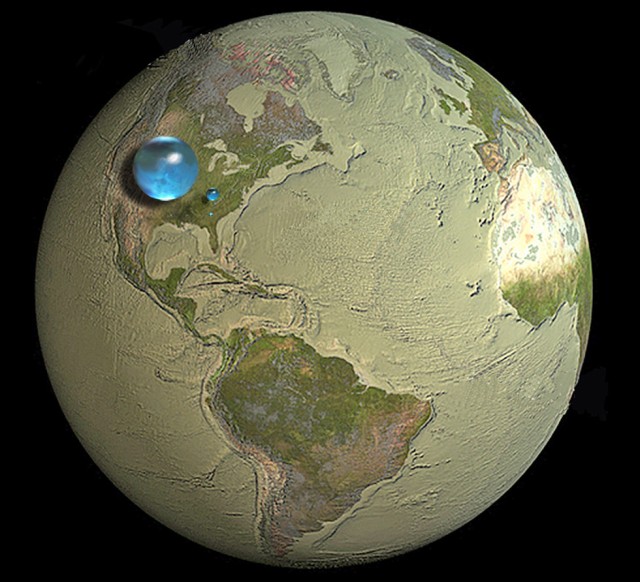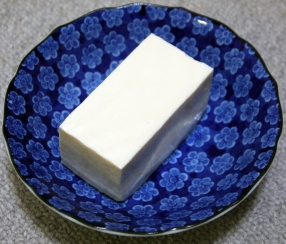Last Sunday I saw a new CBS 60 Minutes segment about how the Earth’s supply of fresh water is being rapidly depleted. This might seem to be a non-problem, but it isn’t. Then, today I read on a blog by a science teacher of the latest data showing the rapid advance of CO2 levels in the atmosphere, the primary greenhouse gas that is promoting climate change. (How’s that polar vortex working for you?)
The two trends are related in that they are new, they threaten life as we know it on this planet, and they both are being caused by us, homo-sapiens. Crops, like other growing things, absorb CO2 and they need fresh water. Jim in Iowa, the author of the science blog, posted in a reply to a commenter (me) a startling graphic showing how small is the amount of fresh water available to the world’s burgeoning population, so I am shamelessly stealing and re-posting it for you here. The larger bubble is all water, including the oceans. The small bubble is what is in all the lakes, rivers and aquifers.
Manned space flight is an exciting thing and the thought of sending people to Mars captures the imagination of most people, but in the grand scheme of things it is what space science offers to teach us about our home planet that ought to really motivate us. The data on CO2 and on fresh water are, in each case, being confirmed on a global basis by satellites. Interestingly, and I hadn’t known this, tracking the gravitational behavior of special satellites can detect and measure the fresh water in aquifers. The data correlate very well with actual tape measurements in wells. In the great Central Valley of California where a quarter of all our vegetables and fruits are grown, so much water has been pumped out of the ground for irrigation that the elevation of the ground has dropped about 6 feet in the last few decades. The pumping has only increased with the drought and nobody knows how much is left. When the aquifers begin to run dry, the quantity of crops will diminish and that will exacerbate the CO2 situation. Or maybe weeds will make up the difference, who knows?
The practical reader right now is probably thinking that the drought will end soon and rain will fix the problem. Alas, that won’t discernibly help because the population of the world is projected to continue upward for the foreseeable future, and it is a population that is learning to like meat, even as the oceans are dying and sea-life moving toward extinction from over fishing. And why, you might ask, is that particularly problematic? It turns out that it takes far more water to produce a pound of meat than it does a pound of vegetables. Chickens and cows eat a lot of growing stuff, so they not only drink but they consume stuff that in turn requires a lot of water. As noted in the 60 Minutes segment, farm production is keeping up only because we are drawing on a freshwater savings account that is receiving few deposits.
There’s a USGS web page on the subject of just how much fresh water is required to produce different things, including meat. The numbers are estimates because the requirement varies depending on methods, but this is nevertheless good data for comparisons. The data are in the form of a quiz, but I’ll give you a cheat sheet.
One ounce of bread: 10 gallons of fresh water.
One pound of chicken meat: 500 gallons.
1 chicken egg: 50 gallons.
One pound of hamburger: 4,000 – 18,000 gallons. (not a misprint)
People are clearly confused about politics right now, hence our badly-divided government. For the first time since WW II, real wages adjusted for inflation are declining for the American middle class. One party is calling for more drilling (drill, baby, drill) and for the export of dirty oil-sands oil to China and elsewhere in the
developing world while the other wants to conserve energy and limit pollution. When the data are clearly saying we are in such environmental trouble, it is beyond me why the public can’t see what is at stake. Even as it is, our descendants are unlikely ever again to see a standard of living as high as what we have become accustomed to.
Want a stock tip? Invest in tofu.







And with Thanksgiving just around the corner, it’s time for the Tofu Turkey!
LikeLike
Um, that would be tofurkey, Frank. Just happens to be my nominee for the world’s funniest word.
LikeLike
I have 7 beautiful grandchildren. I wonder how they will be able to cope with the future we are leaving them. It is certainly not what they deserve.
LikeLike
Agreed, Jim. We must hope for the best, but prepare for the worst.
LikeLike
I saw that “60 Minutes” segment. Deeply disturbing. Alarming, even. I just don’t understand how this kind of information can be all around us and STILL we aren’t doing anything.
And speaking of alarming … that illustration is just plain terrifying.
LikeLike
Agreed, it is alarming. It’s the scale of the thing that does it – it’s hard to realize that even the atmosphere that sustains us is so thin compared to the Earth’s bull that it’s been compared to an onionskin.
LikeLike
You know, I’d have been perfectly happy not hearing that comparison …
LikeLike
“Earth’s bull?” Where did that come from? Dang. I meant Earth’s bulk. 🙂
LikeLike
I know. But it’s still distressing. Not much room for error with so little atmosphere. But we’re polluting it willy nilly anyway.
LikeLike
Pingback: Those silly scientists are still at it | Pied Type
I don’t know about tofu… According to this link, it still takes 244 gallons of water to make a pound of tofu: http://www.treehugger.com/green-food/from-lettuce-to-beef-whats-the-water-footprint-of-your-food.html
LikeLike
That does sound like a lot. However, even using TreeHugger’s numbers, beef still takes 10 to 20 times more water to produce. Also, there is potential for growing soya and other crops with hydroponics. According to Wikipedia on hydroponics, that method uses up to 20 times less water than conventional farming methods.
LikeLike
Well, then the next step would be to make hydroponic cows 🙂
Actually, there is a way to grow beef without actually using cows. It’s not yet economically realistic, but I hope it will be.
http://www.bbc.com/news/science-environment-23576143
LikeLike
Ah, yes, now I remember that – the lab-grown “meat”. Promising. Makes me think too of Star Trek TNG and their “computer” which could synthesize any food or beverage on demand. One would think that impossible, but then who would have dreamed that 3-D printers would become practical?
LikeLike
Water will be the next “Gasoline” of the future, at some point in time, it will even cost more. One thing consumers do not think about. If you consume bottled water, you are creating a deficit somewhere, that water is gone. And as you pointed out “it is alwo not being replaced.”
Great article.
Thanks
LDS
LikeLike